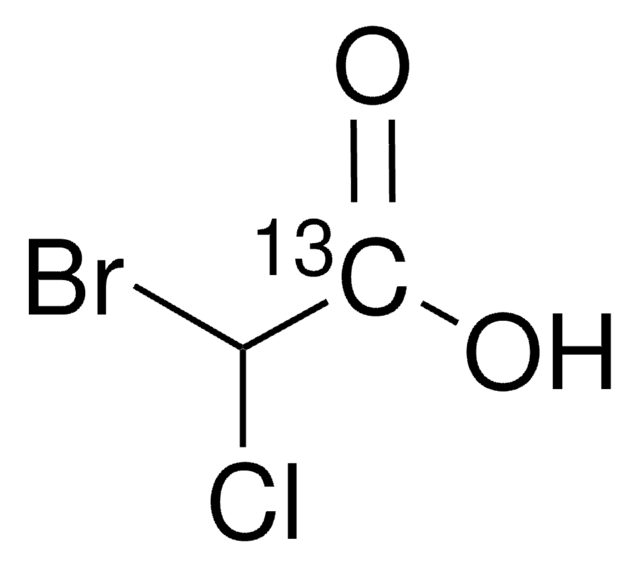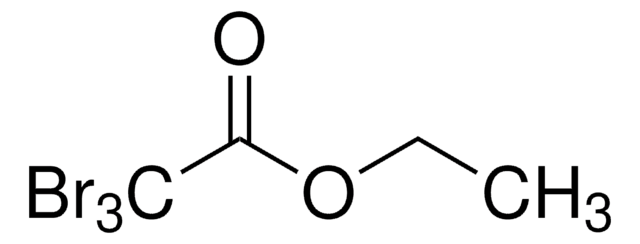T48208
Tribromoacetic acid
99%
Synonym(s):
2,2,2-Tribromoacetic acid
Sign Into View Organizational & Contract Pricing
All Photos(2)
About This Item
Linear Formula:
CBr3CO2H
CAS Number:
Molecular Weight:
296.74
Beilstein:
1755150
EC Number:
MDL number:
UNSPSC Code:
12352106
PubChem Substance ID:
NACRES:
NA.22
Recommended Products
Assay
99%
bp
245 °C (lit.)
mp
128-132 °C (lit.)
SMILES string
OC(=O)C(Br)(Br)Br
InChI
1S/C2HBr3O2/c3-2(4,5)1(6)7/h(H,6,7)
InChI key
QIONYIKHPASLHO-UHFFFAOYSA-N
Looking for similar products? Visit Product Comparison Guide
Signal Word
Danger
Hazard Statements
Precautionary Statements
Hazard Classifications
Skin Corr. 1A
Storage Class Code
8A - Combustible corrosive hazardous materials
WGK
WGK 3
Personal Protective Equipment
dust mask type N95 (US), Eyeshields, Gloves
Certificates of Analysis (COA)
Search for Certificates of Analysis (COA) by entering the products Lot/Batch Number. Lot and Batch Numbers can be found on a product’s label following the words ‘Lot’ or ‘Batch’.
Already Own This Product?
Find documentation for the products that you have recently purchased in the Document Library.
Junjie Wang et al.
Chemosphere, 247, 125793-125793 (2020-01-14)
Haloacetic acids (HAAs) were reported to be the most abundant category of DBPs in swimming pool water. In this study, the formation of HAAs from different organic precursors in swimming pool water, including UV filters, human body fluids, and natural
Jianliang Sun et al.
Chemosphere, 228, 735-743 (2019-05-10)
This study investigated the oxidative debromination of 2,2-bis(bromomethyl)-1,3-propanediol (BBMP), a widely used brominated flame retardant, and the corresponding formation of brominated by-products by the UV/persulfate process. The debromination of BBMP by the UV/persulfate process was primarily driven by sulfate radicals
Xin Zhang et al.
Journal of chromatography. A, 1621, 461052-461052 (2020-04-10)
Ion chromatography-electrospray tandem mass spectrometry (IC-ESI-MS/MS) is used to determine nine haloacetic acids (HAAs), bromate, and dalapon in drinking water samples in U.S. EPA Method 557. In this method, all target analytes are separated and measured with good sensitivity without
Anna Andersson et al.
Environmental science and pollution research international, 26(8), 7305-7314 (2018-03-02)
The occurrence of disinfection by-products (DBPs) in drinking water has become an issue of concern during the past decades. The DBPs pose health risks and are suspected to cause various cancer forms, be genotoxic, and have negative developmental effects. The
Wolfram W Rudolph et al.
Spectrochimica acta. Part A, Molecular and biomolecular spectroscopy, 79(5), 1483-1492 (2011-06-08)
Aqueous solutions of sodium tribromoacetate (NaCBr3CO2) and its corresponding acid (CBr3COOH) have been studied using Raman and infrared spectroscopy. The spectra of the species in solution were assigned according to symmetry Cs. Characteristic bands of CBr3CO2-(aq) and the tribromoacetic acid
Our team of scientists has experience in all areas of research including Life Science, Material Science, Chemical Synthesis, Chromatography, Analytical and many others.
Contact Technical Service







